Info Aktuelles
Professor Karl Wohlmuth has recently published various studies on economic reform policies for Tunisia. Such reforms are overdue in a country which has initiated the Arab Spring events in 2011 and since enjoys substantial international support and goodwill from so many developed countries. A summary article is published to give an overview of the key findings of these studies (see the PDF with the synopsis). The analyses are related to vital branches of economic policy, especially on deindustrialization, reindustrialization and employment policies in Tunisia, and also on innovation, regional development and health sector policies for Tunisia.
Most recent is the new volume of the African Development Perspectives Yearbook 2019 with four studies on Tunisia; the volume was published in early 2020 by the LIT Verlag. Two studies (on innovation and on health sector policies) were done by research groups in Tunisia, the third study on regional development and cluster policies was contributed by an independent researcher on Tunisia, and the fourth study with a focus on development strategies was prepared by two editors of this volume of the Yearbook (see the cover of the Yearbook volume 2019 below). Although Tunisia has quite interesting and sophisticated approaches towards sector policies, the authors found out that there is a need to update the policies and strategies and to synchronize these policies so that the overall development framework becomes more sustainable in Tunisia.
Die Entwicklung der Corporate Governance in Transformationsländern war über viele Jahre ein Forschungsschwerpunkt des IWIM, den Professor Dr. Axel Sell betreute. Aus diesem Kontext stammt auch die jetzt im Cuvillier Verlag veröffentlichte Arbeit von Stefan Barenberg mit dem Titel „Stand und Entwicklung des Corporate-Governance Systems in der Ukraine im Transformationsprozess“. Der Untertitel der Forschungsarbeit lautet: „Eine Analyse der Corporate Governance in ukrainischen offenen Aktiengesellschaften unter besonderer Berücksichtigung politischer, wirtschaftlicher, rechtlicher und soziokultureller Rahmenbedingungen“. Der Autor geht nach der Einleitung (Kapitel 1) auf die Corporate Governance in der Systemtransformation (Kapitel 2), auf die Rahmenbedingungen der Corporate Governance in der Ukraine (Kapitel 3), und auf die Akteure und Mechanismen der Corporate Governance in der Ukraine (Kapitel 4) ein. Im Kapitel 5 stellt der Autor eigene empirische Untersuchungen der Corporate Governance in ukrainischen börsennotierten Aktiengesellschaften an; im Kapitel 6 wird ein Resümee gezogen. Die Arbeit untersucht also die „Interaktionen der zentralen Elemente der Corporate Governance in der Ukraine im Verlauf des Transformationsprozesses. Im Fokus stehen die legislativen Vorgaben und die Praktiken insbesondere in ukrainischen offenen Aktiengesellschaften.“
Das Forschungsprogramm des IWIM zur Ukraine wurde durch mehrere Partnerschaften mit ukrainischen Universitäten unterstützt. Austauschprogramme, Publikationen und Konferenzen waren Teil der Vereinbarungen. Vgl. zum Publikations- und Forschungsprogramm über die Ukraine unter der Leitung von Prof. Dr. Axel Sell den nachfolgenden Link: http://www.iwim.uni-bremen.de/projekte_im_forschungsbereich_professor_sell/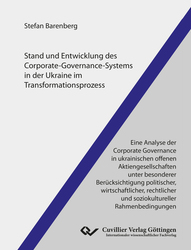
Bibliographische Angaben zur Dissertation von Stefan Barenberg, die von Prof. Dr. Axel Sell betreut wurde (siehe Cover des Buches vom Verlag oben):
„Stand und Entwicklung des Corporate-Governance-Systems in der Ukraine im Transformationsprozess - Eine Analyse der Corporate Governance in ukrainischen offenen Aktiengesellschaften unter besonderer Berücksichtigung politischer, wirtschaftlicher, rechtlicher und soziokultureller Rahmenbedingungen“, erschienen im Cuvillier Verlag, Göttingen 2019, 694 Seiten, ISBN 978-3-7369-9951-0 und eISBN 978-3-7369-8951-1; Link zum Cuvillier Verlag mit näheren Hinweisen zum Produkt: https://cuvillier.de/de/shop/publications/7964-stand-und-entwicklung-des-corporate-governance-systems-in-der-ukraine-im-transformationsprozess
In einer öffentlichen Diskussionsveranstaltung berichtete der Bremer Entwicklungsökonom Professor Karl Wohlmuth über seine Forschungen zum Thema des Zusammenhangs von Wirtschaftswachstum und Armutsbeseitigung im Entwicklungsprozess – dies mit besonderem Bezug zu Afrika. Im Rahmen seines Impulsreferates ging der Professor zunächst auf die aktuelle Diskussion über „Africa Rising“ ein, kontrastierte diesen populären wie hoffnungsvollen Befund aber mit dem sehr hohen Anteil der „extremen Armut“ an der Bevölkerung in Afrika. Nach dieser Einführung wurde auf den statistischen Zusammenhang von Wachstums- und Armutsraten eingegangen; Befunde zu Korrelationen und Kausalitäten wurden erläutert. Schließlich wurden zwei zentrale Konzepte in dieser Debatte kontrastiert: erstens, Wachstumsstimulierung mit Fokus auf Armutsreduzierung (Pro-Poor Growth) und zweitens, Armutsbekämpfung mit Fokus auf Wachstumsimpulsen (Pro-Growth Poverty Reduction).
An Länderbeispielen wurde gezeigt, dass beide Konzepte (Pro-Poor Growth und Pro-Growth Poverty Reduction) durchaus gleichzeitig angewendet werden können. Es wurde vom Referenten auch betont, dass die Nachhaltigkeitsziele Eins („Keine Armut“) und Acht („Menschenwürdige Arbeit und Wirtschaftswachstum“) durch diese Kombination von Entwicklungsinterventionen in afrikanischen Ländern am ehesten verwirklicht werden können. Voraussetzung ist allerdings, dass in den afrikanischen Ländern die Reformpolitik im Rahmen eines langfristigen Entwicklungsprogramms erfolgt. Das Beispiel Äthiopien zeigt, dass beide Konzepte zur Förderung von Wachstum und Armutsreduzierung relevant sind und beide Ziele der Agenda 2030 so am ehesten erreicht werden können. Der Fokus auf landwirtschaftliche und agro-industrielle Entwicklung kann durch Beschäftigungsschaffung zur Armutsreduzierung beitragen, während ausgewählte soziale Sicherungsprogramme so gestaltet werden können, dass sich Wachstumsimpulse ergeben, etwa durch Infrastrukturentwicklung und Kaufkraftschaffung.

Quelle: Bundesministerium für wirtschaftliche Zusammenarbeit und Entwicklung (BMZ); Link: https://www.bmz.de/de/ministerium/ziele/2030_agenda/17_ziele/index.html
Die Präsentation des Referenten kann hier nachgelesen werden (Wohlmuth-Wachstum-Armut 2019). Professor Wohlmuth hat in mehreren Publikationen diese Fragestellungen näher untersucht (vgl. die Auflistung der Publikationen in: http://www.karl-wohlmuth.de/publikationen/ und: http://www.iwim.uni-bremen.de/publikationen/index.html). In mehreren Bänden des African Development Perspectives Yearbook wurde diese Thematik beleuchtet. Der neue Band 22 (2020) des Jahrbuchs wird sich intensiv mit den Nachhaltigkeitszielen beschäftigen (vgl. die Links dazu: http://www.karl-wohlmuth.de/african_development_perspectives_yearbook/ und: http://www.iwim.uni-bremen.de/africa/africanyearbook.htm).
Ein kurzer Bericht zu dieser Veranstaltung wurde vom biz (Bremer Informationszentrum für Menschenrechte und Entwicklung) veröffentlicht; Link: https://www.bizme.de/Veranstaltungen-Rueckblick-2019.html. An der Veranstaltung mitgewirkt haben auch die folgenden entwicklungspolitischen Organisationen im Bremer Raum: BeN (Bremer entwicklungspolitisches Netzwerk e.V); Aktionsbündnis Wachstumswende Bremen; Afrika Netzwerk; „Konsum mit Köpfchen“.
Development Economist Karl Wohlmuth from the University of Bremen has contributed two versions of a paper on “J. M. Keynes, Market Transparency and the Regulation of International Commodity Markets” to the Journal of European Economy, published by the Ternopil National Economic University (TNEU) in the Ukraine (see the link: http://www.tneu.edu.ua/en/). The TNEU is a cooperation partner for our Central and Eastern Europe activities.
First Essay (English Version), Journal of European Economy, Volume 17, Number 4, October - December 2018: BACK TO J. M. KEYNES IN REGULATING INTERNATIONAL COMMODITY MARKETS: AN EXTENDED NOTE ON THE "TRANSPARENCY AGENDA" (Access Links: http://jee.tneu.edu.ua/en/archive-en/2018-en/vol-17-no-4-december-2018-en/ and: http://jee.tneu.edu.ua/en/archive-en/2018-en/1133-journal-of-european-economy-vol-17-number-4-december-2018-pp.html (PDF: English Essay - Wohlmuth-Ternopil-pages 351-397)
Second Essay (Ukrainian Version), Journal of European Economy, Volume 17, Number 4, October - December 2018: МІЖНАРОДНІ ТОВАРНІ РИНКИ: ЛІБЕРАЛІЗМ ПРОТИ ДИРИЖИЗМУ (АКТУАЛІЗАЦІЯ ПОГЛЯДІВ ДЖ. М. КЕЙНСА)/ Internationale Warenmärkte: Liberalismus gegen Dirigismus (Aktualisierung der Äußerungen von J. M. Keynes) (Access Links: http://jee.tneu.edu.ua/en/archive-en/2018-en/vol-17-no-4-december-2018-en/ and: http://jee.tneu.edu.ua/en/archive-en/2018-en/1133-journal-of-european-economy-vol-17-number-4-december-2018-pp.html (PDF: Essay in Ukrainian Language - Wohlmuth-Ternopil-Ukrainische Version-4-20119)
Abstract: In this paper weak and strong forms of global governance of raw materials markets are compared. This is done by comparing the «transparency agenda» with the «structural reform agenda». John Maynard Keynes has worked for decades academically on commodity markets, on speculation and storage, on forward markets and buffer stocks etc., but he has also practiced commercial trading activity on various commodity markets; and he has written and/or influenced the Post-World War Two ICU/ITO (International Clearing Union/International Trade Organization) agendas which are containing detailed provisions for establishing
a world order on commodity markets. He was very much interested in the relation between price volatility of raw materials and its impacts on global macroeconomics, but he was also convinced that appropriate regulations of commodity markets and sectors impact positively on peace and development. He was convinced that strong global governance must be based on simple, stable, effective,
consensual and binding rules. Now the «transparency agenda» with regard of raw materials is so much debated but it is a rather weak form of global governance, while the «structural reform agenda» represents a rather strong form of global governance of the resources sectors. The «transparency agenda» is discussed in great detail in this paper while the «structural reform agenda» is considered in the Conclusions and Outlook section but needs further elaboration in a follow-up paper.
Key issues of this debate are increasingly relevant now as new supply and demand factors impact on the global commodity markets, on prices and quantities; and, strategic, technological, protectionist and military considerations affect more and more the global commodity markets. The markets are on the way of becoming less transparent despite of so many international organizations watching the commodity markets and caring for data and oversight. In the IWIM publications there are many studies dealing with the structure and the functioning of the commodity markets (see the links to Publications of IWIM: http://www.iwim.uni-bremen.de/publikationen/index.html and: http://www.karl-wohlmuth.de/publikationen/).
Professor Karl Wohlmuth von der Universität Bremen hielt Vorträge über Die Innovationspolitik in Deutschland und Bremen. Impulse für die Industrie 4.0 für chinesische Wirtschafts- und Industrieexperten aus der Autonomen Region Guangxi, VR China und aus der Provinz Hubei, VR China (vgl. die Präsentationen des Professors für die Teilnehmer aus Guangxi und Hubei). Das Interesse der Experten war groß hinsichtlich der Bremer Strategie einer Innovations- und Wirtschaftsförderung mit dem Fokus auf Industrie 4.0. Professor Wohlmuth betonte in seinen Vorträgen drei Themen: Erstens, Deutschland im globalen Innovationswettbewerb und die Perspektiven von Industrie 4.0; zweitens, Nationale und Regionale Innovationssysteme: Die Bedeutung für die Industrie 4.0; und drittens, Die Förderpolitik für die Industrie 4.0 im Rahmen der Innovationspolitik: Beispiele aus Bremen. Das Interesse der Experten aus China richtete sich schwerpunktmäßig auf die Organisation der Wirtschafts- und Innovationsförderung im Land Bremen, dem kleinsten deutschen Bundesland, da auch in China nun verstärkt versucht wird, lokale Innovations- und Wirtschaftsförderungsstrategien für mittelgroße Städte und kleinere innovative Regionen zu entwickeln. Der Fokus in China liegt dabei zunehmend auf Strategien der Entwicklung von Konzepten für die Förderung von Industrie 4.0.
Das Land Bremen findet bei den chinesischen Experten auf Grund der kurzen Wege bei der Entscheidungsbildung großes Interesse, da alle wichtigen Stakeholder für die Förderung von Industrie 4.0 lokal konzentriert und vernetzt sind. Besonders wichtig waren für die Experten aus China Beispiele für die Gestaltung einer Politik zur Förderung von Industrie 4.0 im Bremer Raum; die zentrale Rolle der Behörden, der Interessenvertretungen, der Weiterbildungsträger, der Unternehmen und der Universitäten in Bremen wurde in der Diskussion stark thematisiert. Die Wirtschaftsförderung Bremen berät zu Fragen von Industrie 4.0 und die chinesischen Experten wollten an konkreten Beispielen für Förderungsmaßnahmen sehen, wie die Bremer Institution dabei vorgeht. Die Rolle der Interessenvertretungen im Land Bremen, wie die Arbeitnehmerkammer und die Gewerkschaften, aber auch die Handels- und Handwerkskammern und die Arbeitgeberverbände, wurde von Professor Wohlmuth ebenfalls ausführlich an Beispielen dargestellt. An Aktivitäten von zwei bedeutenden bremischen High Tech-Unternehmen (BEGO und OHB) wurde auf die Implementierung von Maßnahmen der Industrie 4.0 eingegangen; deren Initiativen für die bremische Region wurden ebenfalls dargestellt. Die von der Universität Bremen geführte „Forschungsallianz“ von hochkarätigen Forschungsinstituten am Technologiepark Bremen ist mit dem Thema „Digitale Transformation“ an den Forschungen zu Industrie 4.0 stark beteiligt; auch der Auftrag der „Forschungsallianz“ im Rahmen der industriellen Transformation Bremens wurde erläutert. Das Gesamtsystem der bremischen Förderpolitik für Industrie 4.0 wurde an sechs interagierenden Polen des bremischen Innovationssystems abschließend erläutert.
Die Experten aus der Autonomen Region Guangxi, VR China (Fläche 237.000 km² und 48 Millionen Einwohner; Wirtschaftsbasis: Landwirtschaft, insbesondere Zuckerrohr, Energie, Metalle, Tourismus, etc.) und aus der Provinz Hubei, VR China (Fläche 186.000 km² und 57 Millionen Einwohner; Wirtschaftsbasis: Eisen- und Stahlindustrie; Metall- und Textilindustrie; Automobil- und Elektronikindustrie, Maschinenbau, Tourismus, etc.) sind mit der industriellen Transformation in ihren Gebieten/Regionen federführend befasst; der Fokus liegt immer stärker auf Industrie 4.0. Seit mehreren Jahren ist der Bremer Professor im Rahmen dieses Besuchsprogramms an Workshops als Referent beteiligt. Der Fokus der Vorträge von Professor Wohlmuth liegt auf den Strukturen des bremischen Innovationssystems, das als integraler Bestandteil des Nationalen und des Europäischen Innovationssystems analysiert wird. Weitere Einladungen im Jahr 2018 kamen zu Vorträgen für Delegationen aus Tianjin, eine der vier regierungsunmittelbaren Städte der VR China, und von der University of Xuchang. Provinz Henan.
To prepare for the impacts of the escalating political and economic crisis in Sudan, the Foreign Office in Berlin has invited key international researchers on Sudan, representatives from German and UK ministries, representatives from thinktanks, and representatives from international NGOs to discuss under Chatham House rules about ways to address the Current Dynamics in Sudan, the Future of the International and Regional Interventions in Darfur, and the Regional Dynamics of Sudan. Professor Karl Wohlmuth gave a presentation on Sudan’s economic problems and perspectives, highlighting the internal economic problems and the cross-border issues which are affecting the development of the country (see the Presentation on Sudan by Karl Wohlmuth). Main emphasis in the presentation was on the need to revise the national economic policy of Sudan towards stability, innovation and diversification and towards a more balanced and mutually beneficial cooperation with the seven neighbouring countries, especially so the South Sudan.
Professor Wohlmuth referred to the challenges and opportunities of economic and political cooperation programmes of Sudan with South Sudan which would yield high returns for the people and the economy of both countries – because of the high interdependence of the countries on oil production and oil transport issues, the economic role of the states (provinces) along the international border of Sudan and South Sudan, and the necessity to end conflicts in Sudan and in South Sudan through negotiated peace and development programmes. The end of the regime of Omar al-Bashir in Sudan may now provide a window of opportunity to start a “development-friendly” cooperation between the governments in Khartoum and Juba, and to build an alliance for peace and development along the international border between regions in Sudan and South Sudan.
Professor Karl Wohlmuth also presented his blueprint for an economic reform programme for Sudan and South Sudan as based on publications in the SERG Discussion Papers (see the links: http://www.karl-wohlmuth.de/serg_sudan_discussion_papers/ and http://www.iwim.uni-bremen.de/publikationen/pub-sudan.htm). Recently, Volume 20 (for 2018) of the African Development Perspectives Yearbook has brought interesting articles towards a strategy on Sudan’s science, technology and innovation (STI) policies, and on Sudan’s industry and agriculture policies. This part of the Yearbook on Sudan (Unit 2) builds a frame for a strategic reorientation of the Sudanese economy towards structural transformation, economic revitalization and diversification (see on this volume the links: http://www.iwim.uni-bremen.de/africa/africanyearbook.htm, and: http://www.karl-wohlmuth.de/african_development_perspectives_yearbook/, and: http://www.lit-verlag.de/reihe/adpy).

In volume 20 of the African Development Perspectives Yearbook with the title “Science, Technology and Innovation Policies for Inclusive Growth in Africa - General Issues and Country Cases” major strategic and policy issues are analysed. The guiding issue is how to make Science, Technology and Innovation (STI) Policies relevant for inclusive growth strategies in Africa so that socio-economic transformation strategies will take off. Although STI polices are considered as indispensable for sustainable growth in Africa, the steps towards such policies and strategies are not yet streamlined enough. Therefore, it is necessary to learn from the successful cases of STI development in Africa and in other emerging countries.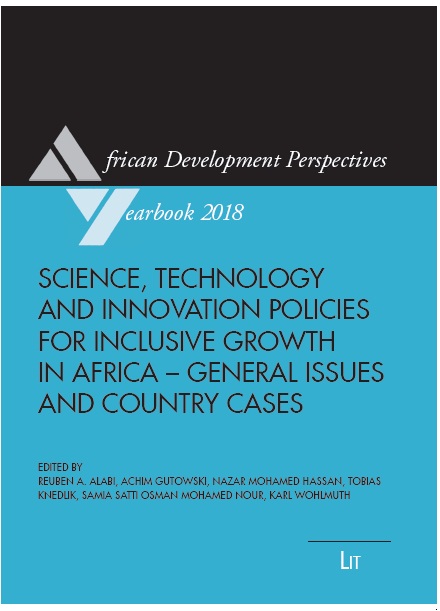
African Development Perspectives Yearbook 2018:
On Science, Technology And Innovation Policies For Inclusive Growth In Africa
In this volume a new approach is envisaged. Based on Africa’s deep-routed structural problems, the STI policies are related to Africa’s economic transformation agenda. In a first part of Volume 20 the general issues of introducing effective STI policies are presented, based on visions, strategic plans and the requirements of functioning national innovation systems. In a second part, country case studies highlight the new approach. Specific case studies, such as for Sudan and Nigeria, are presented, as these two countries have a long history of STI development. Strategies and policies for more coherent STI policies are presented (see the Cover of volume 20: PDF 91042-4 Alabi).
Complementary to this volume is Volume 21 with the title “Science, Technology and Innovation Policies for Inclusive Growth in Africa - Human Skills Development and Country Cases”. In the first part of Volume 21 the role of human skills development for capacity building in STI systems is discussed. This is based on examples from Cameroon, Nigeria and Mauritania. In the second part the national innovation systems and STI policies of North African countries (Egypt and Tunisia) are evaluated, to assess how they can be directed towards economic transformation and inclusive growth.
With Volume 21 the African Development Perspectives Yearbook project is approaching 30 years of activity as the first volume was published in 1989 under the title “Human Dimensions of Adjustment”. In these 30 years the African Development Perspectives Yearbook has become the major annual publication in English language on Africa in Germany. Guiding principle is the inclusion of authors and editors from Africa, the publication of essays which are also readable by media people, development actors and policymakers, and the presentation of successful policies, projects and programmes which highlight that Africa can succeed in regard of its ambitions and that it can rise in growth and development.
The Research Group on African Development Perspectives has just released the International Call for Papers for Volume 22 (2020) and invites Abstracts and nominations for the position of Guest Editors (see International Call for Papers Volume 22, for the year 2020).
Invited are contributions for Volume 22 (2020) of the African Development Perspectives Yearbook with the title “Sustainable Development Goal 9 (Infrastructure, Industrialization, Innovation) and African Development – Challenges and Opportunities”. See the International Call for Papers for Volume 22 (for the calendar year 2020). The contributions should be evidence-based and policy-oriented. High academic standards are requested and will be checked by referees. Non-technical papers with deep analysis, which are readable by practitioners in development cooperation and by media people, have a high priority in the selection process. The concept of the contribution and the methodological framework of analysis should be outlined in the Abstract which is submitted to the Editors, Professor Karl Wohlmuth (Bremen) and Professor Tobias Knedlik (Fulda).
Source: United Nations
Sustainable Development Goal Nine (Industry, Innovation and Infrastructure) and African Development
Upon acceptance of the paper, the Contributors will receive Editorial Guidelines and a Template. Accepted papers will be grouped into Thematic Units, and the respective Unit Editors will contact the contributors quite regularly during the process of finalization of the paper to discuss the various drafts. The African Development Perspectives Yearbook is published since 1989 (see the link to the website of the Yearbook project: http://www.iwim.uni-bremen.de/africa/africanyearbook.htm). The volumes 20 and 21 (for the years 2018 and 2019) were on the theme “Science, Technology and Innovation Policies for Inclusive Growth in Africa”. In 2019, the Research Group celebrates the event of 30 years of publishing the African Development Perspectives Yearbook. Each of the volumes 20 and 21 had three Thematic Units. Volume 22 will be related to the year 2020; in case of many high-quality submissions a Volume 23 for the year 2021 can be added. Guest Editors for various Thematic Units are also invited to apply. Editors of Thematic Units are also becoming automatically the status of Volume Editors. Guest Editors are responsible for a Thematic Unit with 3 – 5 contributions and an Introduction. For specific themes see the Main Issues proposed by the Editors for Volume 22 as presented in the International Call for Papers Volume 22 (2020). These proposals for themes are only examples. The Editors are open to further suggestions in the context of SDG 9..
The theme for volume 22 on “Sustainable Development Goal 9 (Infrastructure, Industrialization, Innovation) and African Development – Challenges and Opportunities” is related to the importance of Goal Nine in the context of the SDG Agenda 2030. SDG 9 is comprehensive and is focussing on “Build resilient infrastructure, promote inclusive and sustainable industrialization and foster innovation”. The targets and indicators related to Sustainable Development Goal Nine focus on:
- a) developing quality, reliable, sustainable and resilient infrastructure;
b) promoting inclusive and sustainable industrialization and raising significantly industry’s share of employment;
c) increasing the access of small-scale industrial and other enterprises to financial services, and facilitating their integration into value chains and markets;
d) upgrading infrastructure and retrofitting industries to make them sustainable in terms of resource-use efficiency and adoption of clean and environmentally sound technologies; and
e) enhancing scientific research, upgrading the technological capabilities of industrial sectors, and encouraging innovation.
Focus in SDG 9 is also on facilitating sustainable and resilient infrastructural development, on supporting domestic technology development, research and innovation, and on increasing access to information and communication technologies.
The contributions will add to the knowledge about the role of SDG 9 for sustainable development and inclusive growth in Africa. Understanding the links to the other 16 SDGs of the Agenda 2030 is of great importance when drafting contributions for volume 22 of the African Development Perspectives Yearbook. The contributors should consider the links to, the spillovers from and the interactions with the other SDGs.
A new research and strategy paper on “Sudan in the 21st Century: Seeking Pathways Forward” was published as the number 43 in the SUDAN ECONOMY RESEARCH GROUP (SERG) DISCUSSION PAPERS series at the University of Bremen (see the link to the SERG series: http://www.iwim.uni-bremen.de/publikationen/pub-sudan.htm). Author is Dr. Mohamed al Murtada Mustafa, Former Undersecretary of Labour, Ministry of Labour, Sudan and Former Director of ILO Offices in Harare and Cairo. The paper argues that for a successful reconstruction of the Sudanese economy five pillars are needed: education, entrepreneurship, agriculture, industry and management. These five pillars represent the main sectors and functional areas which must interact for inclusive growth to occur. Interaction depends on institutional reform and on a developmental role of the civil service. The separation of South Sudan in 2011 has fundamentally changed the situation of Sudan, and it is no longer possible to pursue uncoordinated, short-term and small-scale policy changes. Much more is needed – long-term structural strategies and deep policy changes must be implemented in Sudan. Fundamental reforms are proposed in the study and policy recommendations are presented for these five pillars.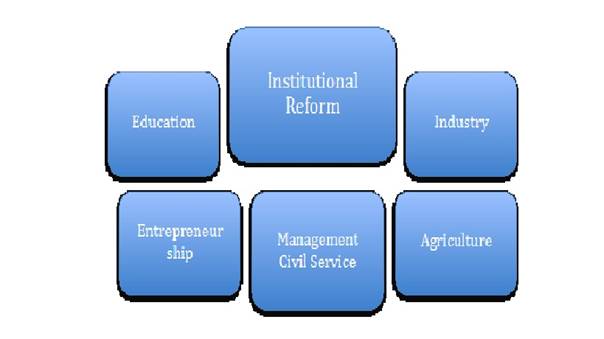
Source: Dr. Mohamed al Murtada Mustafa, Khartoum, Sudan
The Strategic Pillars for Sudan’s Development
The author emphasizes also the fact that the Sudanese government has seen a great number of advisory and consultancy reports on economic strategies since 1956 when the country became independent. All these proposals and suggestions from donors, think tanks and international organisations were well-minded and valuable but were repetitive in content and never were implemented (neither by democratic governments nor by military regimes). Therefore, a new approach is needed by focussing on a developmental civil service and a new leadership for the country which is based on a broader group of policy actors – coming from all regions of the Sudan, from representative political circles and from significant parts of the civil society. Such an approach is formulated in the new SERG study. Professor Karl Wohlmuth from the University of Bremen has peer-reviewed and re-edited the paper by Dr. Murtada. It will also be circulated in Arabic language by the author.
The new volume of the African Development Perspectives Yearbook – number 20 for the year 2018 – has also a strong strategic focus on Sudan; emphasis is on the strengthening of the National Innovation System (NIS) and the Science, Technology and Innovation (STI) Policies of Sudan (issue one), on developing new policies to support innovative industrial enterprises (issue two), on attracting foreign enterprises and stimulating the technology transfer to domestic firms (issue three), and on increasing the yield in agriculture through R&D and appropriate dissemination of research results to the farming sector (issue four). Over the years the African Development Perspectives Yearbook has published regularly on Sudan and South Sudan and so has participated actively to the discussion on new development strategies for these countries (see the link to the Yearbook editions: http://www.iwim.uni-bremen.de/africa/africanyearbook.htm). The research on Sudan by the SERG is summarized in the report on Sudan Studies in Bremen (see the link to number 38 on “Sudan Studies in Bremen 1979-2011”: http://www.iwim.uni-bremen.de/publikationen/pub-sudan.htm). Most of the papers published by the SERG have a focus on strategies and policies to advance structural change in Sudan (and in South Sudan).

Professor Karl Wohlmuth gave a Keynote Lecture on “Transport Infrastructure and Regional Integration in Africa – A Neglected Link” at the second “Aviation in Africa” International Workshop which was organized in June 2018 by the Institute for Transport and Development (ITD) of the Hochschule Bremen (City University of Applied Sciences Bremen) on behalf of the international scientific organization GARS (German Aviation Research Society). Professor Wohlmuth emphasized in his lecture the following themes: Scoping the neglected link of transport infrastructure and regional integration; New Initiatives to link Infrastructure, Continental and Regional Development in Africa; Transformative Regional Integration and Infrastructure Development in Africa; The “Infrastructure State”, Regional Integration and Aviation Development in Africa; and Conclusions –Way Forward in Africa. More than hundred experts on aviation and development participated at the three days meeting in Bremen (see the PDF Programme and the PDF Power Point Presentation).
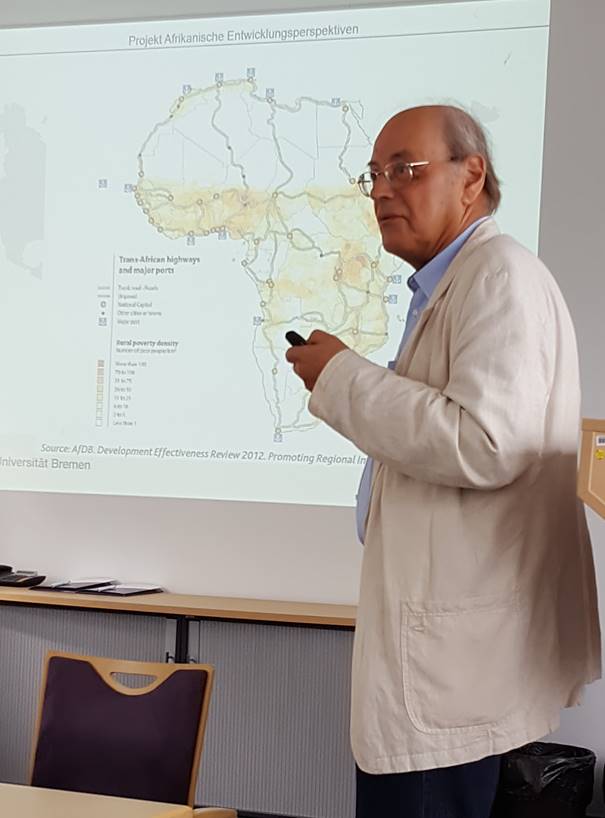
Professor Karl Wohlmuth speaks about “Transport Infrastructure and Regional Integration in Africa”
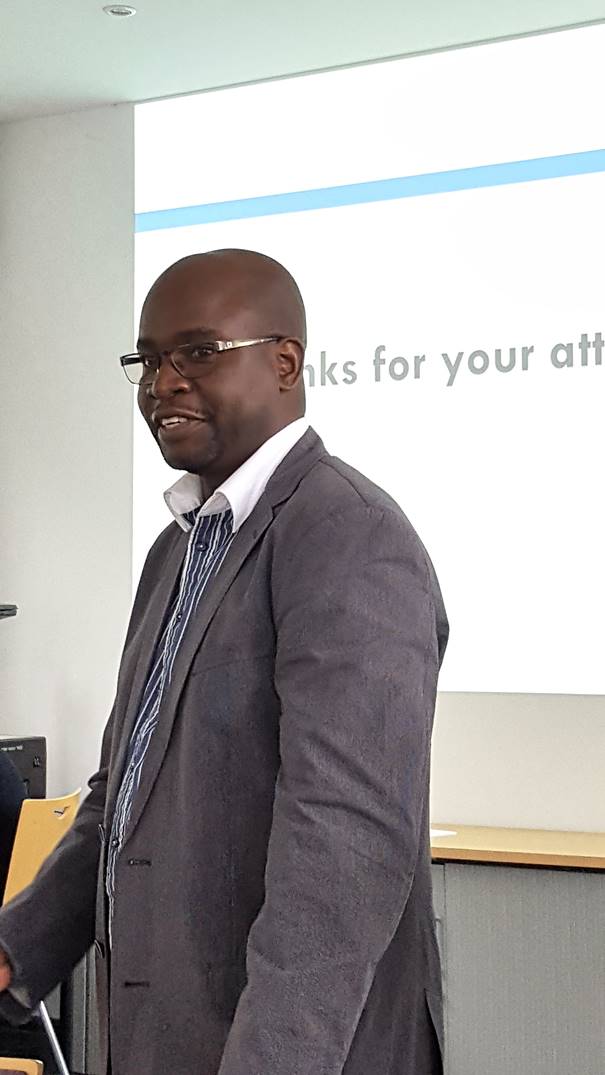
Professor Deusdedit Rwehumbiza from the University of Dar es Salaam speaks about “Perspectives of regional integration in East Africa”

Participants (left Conference Organizer Professor Hans-Martin Niemeier from the ITD) listen to the lecture of Professor Hans-Heinrich Bass about “Monetary Integration in East Africa”
Professor Wohlmuth argued in his lecture that a new approach towards transformative regional integration is needed for Africa to overcome the bottleneck factors which impede structural change in Africa. Not trade liberalisation is the key priority issue of regional integration, but structural transformation between and within economic sectors. This “transformative regional integration approach” contrasts with the “linear regional integration model” which was inherited in Africa from the European integration process. Also, it was strongly emphasized that transport infrastructure development is biased in Africa as roads construction (within the countries and at cross-border level) is still the key transport sector development business. Other transport modes, like railways, aviation, waterways and rivers, and ocean shipping, are still neglected. But most seriously, the mobility concepts are not clarified in Africa; it is not made clear how the transport modes are really used (by producers and consumers). Huge investment projects are agreed upon in the context of national, regional and continental transport development programmes, but financing, implementation and maintenance levels are weak, and the social, commercial and economic benefits of the projects are not always made clear. The map of PIDA’s Priority Action Plan (see below) shows how neglected other transport modes than roads (along the Corridors and the Trans African Highways routes) are and will be until 2040.

From: Export-Import Bank of India, Connecting Africa: Role of Transport Infrastructure, March 2018, p.42
Note: PIDA/Programme for Infrastructure Development in Africa
Aviation has huge developmental advantages for Africa, but this transport sub-sector is still neglected in all decision-making processes, at national, regional and continental African political and governance levels. The observed progress of Africa in terms of ICT (Information and Communication Technology) and STI (Science, Technology and Innovation) development indicators gives hope and will facilitate the build-up of an aviation infrastructure. Aviation has huge effects in Africa on employment, industrialization, technological development, skills and human resources development, regional development, export development, mobility of people, goods and ideas, and especially on the opening of economies for trade, investment, technological innovation and skilled migration. The proposed publication project for volume 22 of the African Development Perspectives Yearbook on “Sustainable Development Goal 9 (Infrastructure, Industrialization and Innovation) and African Development – Challenges and Opportunities” will consider the issues of a more balanced transport infrastructure in Africa as a base for a broad industrialization advance and the speeding-up of innovation processes in African firms (see PDF International Call for Papers for Volume 22, 2020). Members of GARS and other experts on aviation in Africa are invited to submit their Abstracts to the Editors of the African Development Perspectives Yearbook (see the link to the Yearbook programme: http://www.iwim.uni-bremen.de/africa/about.htm).


